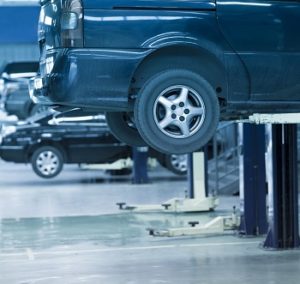By Michelle Huitt, Assistant Vice President
 Dealerships and repair shops typically have aboveground storage tanks with capacities of up to 550 gallons, which means that the tanks are not regulated by the states and therefore do not require Financial Assurance. Based on this, many of these businesses do not purchase pollution coverage. It is possible that they have some limited pollution coverage in their General Liability policies, but not enough to cover a significant pollution release.
Dealerships and repair shops typically have aboveground storage tanks with capacities of up to 550 gallons, which means that the tanks are not regulated by the states and therefore do not require Financial Assurance. Based on this, many of these businesses do not purchase pollution coverage. It is possible that they have some limited pollution coverage in their General Liability policies, but not enough to cover a significant pollution release.
Certainly preventing a release should be an insured’s first line of attack, as well as having a Spill Prevention Control and Countermeasure plan to deal with a spill in the event one does occur. For this class of business, a Standard Operating Procedures manual with emergency instructions and contact names can also be helpful. Proper testing and regular maintenance of tanks and piping is also essential as the vast majority of pollution claims come from the piping. Preventing the loss can be far less costly then clean up costs and fines that may be incurred due to the spills. All personnel should be trained on spill prevention and clean up procedures.
Pollution Exposures
One exposure that is unique to this type of risk is the storage and disposal of used motor oil. Properly managing used motor oil is important for several reasons―to protect the environment, to protect the health of people, to protect against environmental damages, and the option to reuse rather than waste this resource. For dealerships, in addition to the exposure related to the cars parked on the property, they often also perform repairs and regular maintenance on vehicles. The use of hydraulic lifts and chemicals for this type of work may result in spills, leaks, runoff etc., posing a possible pollution release.
Additionally, because used oil has heat value, it can be used as fuel, and proper burning procedures and equipment must be used to reduce the risks to people’s health and the environment. Considerations include how the oil is stored and how is it transported to be used in the heating process. Before using used oil for heating purposes, businesses should be familiar with the Used Oil Management Standards to insure all regulations are being adhered to as required.
The Comprehensive Environmental Response, Compensation and Liability Act (CERCLA) was passed to help finance the cleanup of sites contaminated with hazardous waste. CERCLA allows the federal government to hold any party that created or contributed to the creation of a hazardous waste site financially responsible for cleanup cost.
Coverage for These Risks
By offering your insureds the right coverage for their dealerships and repair businesses, they can protect their investments and in the event that the tanks do require proof of Financial Assurance, this policy can also satisfy any federal and state requirements for financial responsibility. The PartnerOne Fuel Solutions program provides coverage for cleanup costs at these businesses due to releases from site itself and/or scheduled tanks on the policy. Coverage is also provided for third party bodily injury and property damage claims emanating from the site itself and/or scheduled tanks on the policy. The policy can also include coverage for Waste Transportation and Non-owned disposal locations.
For more information on this product and informational resources for your dealer & repair clients, contact us today.
